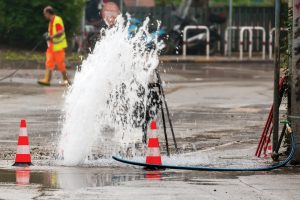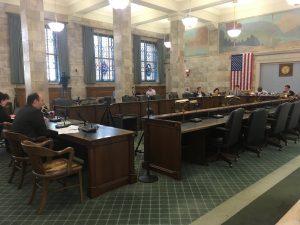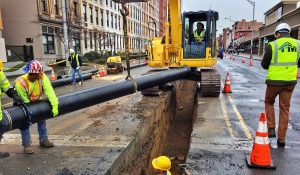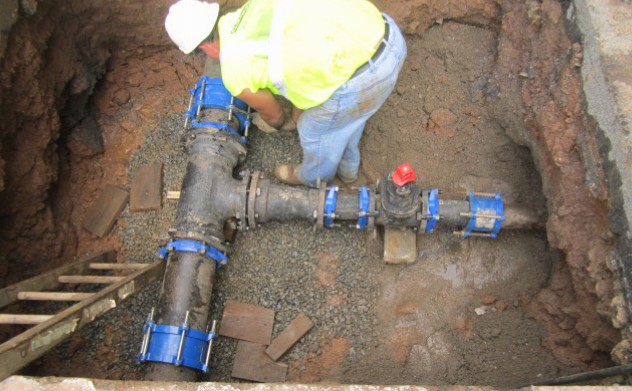Ensuring sound drinking water systems is one of Jersey Water Works’ goals. Through the priorities outlined in the “Our Water Transformed” report, the collaborative has focused on incentivising and requiring asset management programs, ensuring adequate funding for capital investment, and greater public support. The Water Quality Accountability Act (WQAA), enacted in 2017, is a tool that can help achieve those goals.
The Senate Community and Urban Affairs Committee recently held three hearings to discuss the WQAA. The WQAA was established to require water purveyors to “improve the safety, reliability, and administrative oversight of water infrastructure” systems. The act has the potential to serve as a national model for regulating and reporting the conditions of our water systems. But according to Senator Troy Singleton, “the Water Quality Accountability Act was a landmark piece of legislation that has yet to see its full implementation”. In response to that, the legislature chose to hold three hearings to “determine why there has been a lack of compliance and what more can be done to ensure greater accountability, transparency and adherence to the Water Quality Act. It is our collective hope that these hearings will provide us with the information necessary to improve the water infrastructure in communities throughout our State.”

The WQAA can help water systems focus on regularly investing in proactive solutions instead of reacting to emergencies, like this water main break.
A diverse group of water, policy, utility, and environmental experts provided testimony throughout three hearings, including many Jersey Water Works members.
| Missed the hearings? You can listen to them here: | |
|
September 19 |
|
|
September 25 |
The first hearing on September 10 included testimony from the NJ Department of Environmental Protection, which holds a central role in the implementation of the WQAA, and the NJ Board of Public Utilities, which also holds an essential role in oversight.
- Deborah Mans, Deputy Commissioner of the NJ Department of Environmental Protection*
- Joe Fiordaliso, President of NJ Board of Public Utilities and Mary-Anna Holden, Commissioner of Board of Public Utilities*
- Chris Sturm, Managing Director, Policy and Water of New Jersey Future*
- Dr. Manny Teodoro, Director of Policy and Politics Program of Texas A&M
The second hearing took place on September 19. Zoe Baldwin, Director of Government Affairs and Communications for UTCA, mentioned JWW and the collaborative report Water Infrastructure Drives New Jersey’s Economy to emphasize that investment in water infrastructure can be a driving force in the state’s economic growth. Several who testified also mentioned how infrastructure upgrades generate revenue and jobs.
- Melanie Walter, Director of Local Government Services of the Department of Community Affairs*
- AJ Sabath, Building and Constructions Trades Council of NJ*
- Michael Travostino, Government Affairs Director of Associated Construction Contractors of NJ
- Cheryl Norton, President of NJ American Water*
- Zoe Baldwin, Director of Government Affairs Utility and Transportation Contractors Association*
- Evan Piscitelli, Executive Director of National Utility Contractors Association of NJ
- Peggy Gallos, Executive Director of Association of Environmental Authorities*, with David Harpell, Jackson Township Municipal Utilities Authority
- Mike Cerra, Assistant Executive Director of NJ League of Municipalities

JWW testifying in front of the Committee on September 25.
The third hearing on September 25 included testimony from Jersey Water Works. JWW’s testimony focused on recommendations to the DEP during the implementation of the WQAA, submitted by the JWW Asset Management and Finance Committee and the Infrastructure Management and Finance Committee of AWWA-NJ in January 2019.
- John Hildabrant, President of Aqua New Jersey*
- Emad Sidhom, Director of Engineering of SUEZ Water, with Craig O’Connell, Director of Utility Operations of SUEZ Water*
- Michael Drulis, Chair of Drinking Water Coalition of NJ, with Richard Calbi, Drinking Water Coalition of NJ
- Ed DiFiglia, Program Manager of Jersey Water Works
- Steven Blankenship & Chris Andreasen, Director American Water Works Association of NJ*
- Dr. Daniel Van Abs, Rutgers University*
- Jeff Tittel, Senior Chapter Director of Sierra Club New Jersey
- David Pringle, Campaign Director of Clean Water Action*
*Indicates JWW member organization

Investing in our state’s water infrastructure means investing in local jobs, our economy, and our communities.
The WQAA has the potential to be an effective tool for ensuring that systems maintain strong, sustainable infrastructure. If implemented fully, it can mean that water systems are preventing problems such as lead in drinking water, main breaks and water loss– before they start. Jersey Water Works supports smart investment in our state’s aging water infrastructure, adequate utility revenue to invest in those plans, and transparency in reporting those plans to the customers. The Water Quality Accountability Act can be a national model on how to improve and invest in aging water infrastructure.
News Coverage:
NJ water infrastructure: “Out of sight, out of mind” no more (Asbury Park Press)
Senate to hold hearing on the ‘Water Quality Accountability Act’ (Insider NJ)
Water accountability review reveals pervasive nature of NJ infrastructure woes (NJTV)
New Jersey state Senate panel investigates state’s water quality law (News 12 New Jersey)
NJ lawmakers say water quality data should be more accessible to the public (WHYY)
Legislators note slow progress on state’s water quality management law (NJTV)
Ruiz to DEP on lead crisis: ‘There has to be a level of urgency’ (Insider NJ)
Senate to hold third hearing on the ‘Water Quality Accountability Act’ (Insider NJ)
Slow progress on NJ’s water quality management law frustrates legislators (NJ Spotlight)
